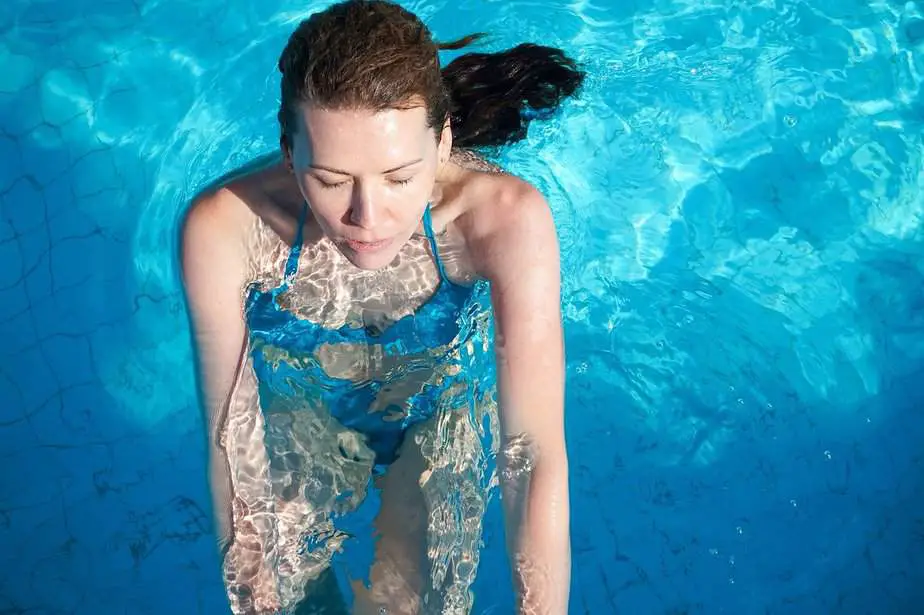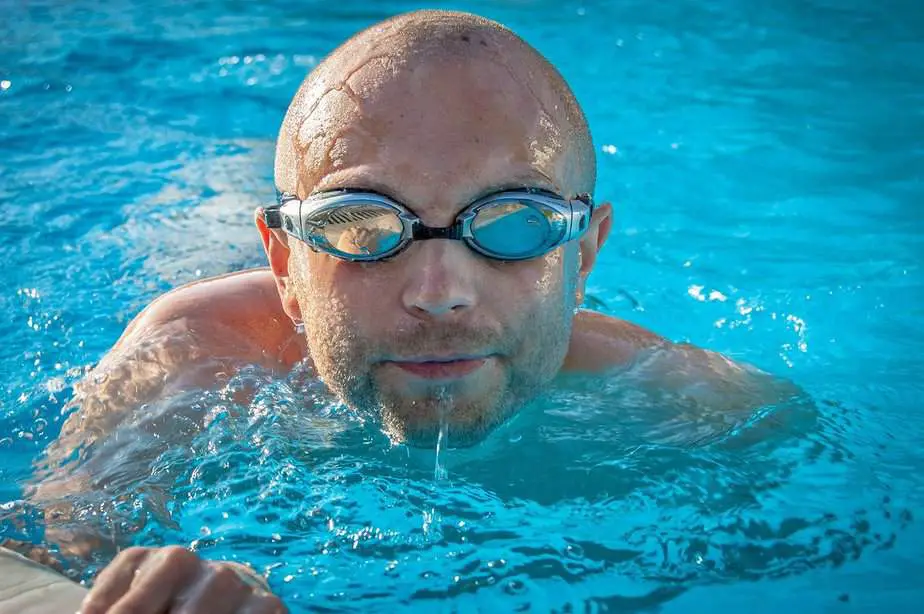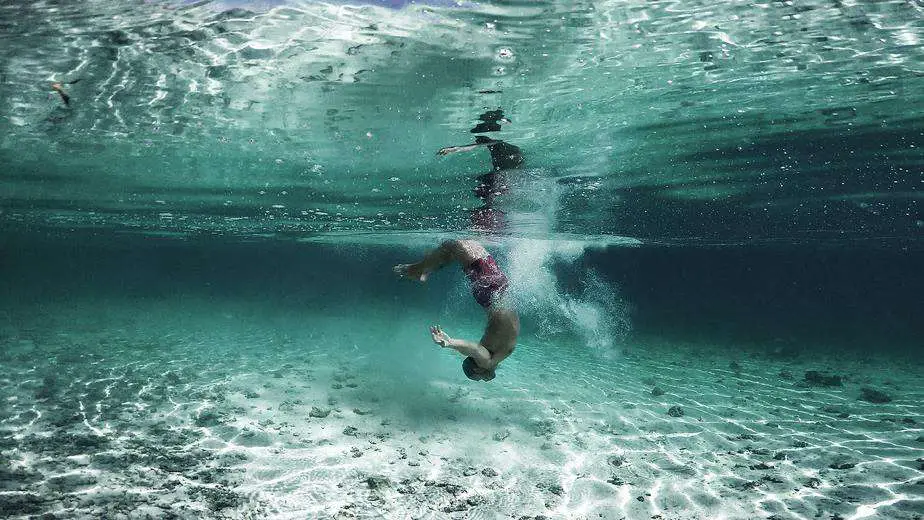If you don’t have much experience with swimming or water sports in general, you might reasonably wonder why everybody seems to be wearing either goggles or a dive mask. After all, don’t our eyes work underwater? So why bother wearing some kind of eye covering if it’s just gonna fog over, leak, or dig painfully into our head when worn tightly?
Can you open your eyes in the ocean? Technically yes, you can open your eyes in the ocean or even in a swimming pool. However, if you have the option to wear eye protection, we recommend you do so. Any public body of water is going to be full of bacteria, viruses, and other irritants that may hurt your eyes. Also, salt water will draw water from your eyes, causing a burning sensation. After opening your eyes underwater, they may feel highly sensitive or will be in pain. You can soothe your eyes by rinsing them with fresh water, moisturizing with a saline solution, using a cold compress, and other methods.
As you can see, just because you can do something doesn’t mean you should. There is a good reason why everybody wears goggles or a dive mask – because they don’t want to expose their eyes to contaminated water and cause eye pain or even an eye infection. Even diving in a salt water pool or chlorinated pool water, you may experience blurry vision that should hopefully heal on its own. However, if you experience persistent pain or irritation, you may have to see a doctor.
Opening your eyes in the ocean – is it safe?

Since most of our water sport activities are done in the ocean, we’ll discuss this first. The answer is: Yes, you can open your eyes in the ocean, but it’s not always a good idea.
In case you’ve never tried opening your eyes in the ocean before, we can confirm that it can cause a burning sensation though some people claim that they feel no pain at all. These people may be part fish.
Some are more sensitive to it than others, and they might feel that it’s too painful to even open their eyes. This leads to the next question: can saltwater damage your eyes? The answer is generally no but it’s certainly possible.
The stinging sensation in your eyes is caused by the salt in the salt water. Salt draws moisture out, which means that it will dry out your eyes until your eyes adjust to the saltiness of the saltwater.
After you exit the water, what’ll happen for most people is that their eyes will be a bit blurry and they’ll also be extra sensitive to the light afterwards. In rare cases, your eyes might experience pain afterwards. These symptoms should go away on their own but if they persist for several hours, then we recommend seeing a doctor.
That said, this is all assuming that the body of water you’re opening your eyes in is clean. Unfortunately, this is not always the case. The ocean is filled with bacteria and many people pee in the water. Depending on where you are, there may also be sewage runoff, garbage, or even chemicals dumped into the water.
There is a simple solution for this; wearing goggles can protect your eyes from superficial damage. Who knows what’s floating around in the ocean? You could potentially get a splinter or a piece of debris in your eyes. This is what we mean when we say there’s always a possibility that something can go wrong. For these reasons and more, we still recommend wearing goggles or a dive mask even if you can theoretically open your eyes in the ocean.
Opening your eyes in chlorinated water

Whether it’s a backyard pool or the swimming pool, you’ve probably had chlorinated water get in your eyes at some point in your life. We’ve all had stinging, bloodshot eyes after a water fight, getting our goggles ripped off, or having water leak in. However, is this stinging sensation a sign that we’ve been damaging our eyes?
As you know, water in a pool contains chlorine. Chlorine is a chemical that should prevent bacteria and diseases from spreading. However, generally speaking, exposing your eyes to chemicals is a bad thing regardless.
Chlorinated water (pool water) can strip away the tear film that protects our corneas. This leaves the cornea exposed to all of the dirt and bacteria floating around in the pool that the chlorine didn’t manage to get rid of. It’s ironic that the very chemical intended to protect you ends up being the thing that can hurt you badly. Chlorine still does more good than harm, but it’s not worth the risk; just wear goggles.
Some of the common risks associated with getting chlorinated water in your eyes are:
- Pink eye (conjunctivitis): A common eye infection that most commonly affects swimmers. It can be bacterial or viral, and can be easily contracted or passed through the water. It’s almost a sure thing if you’re not wearing goggles in the pool.
- Bloodshot eyes: These are the eyes that make it look like you just burst a blood vessel. They are caused by dehydration because of the chlorine removing your tear film. You can also experience temporary blurriness in your vision or sensitivity to light.
- Acanthamoeba keratitis: This is the medical term referring to a severe eye infection caused by amoeba (a very tiny parasitic organism found in water) getting trapped between your cornea and contact lens. This organism can live in your eye and do serious damage, resulting in ulcers, permanent vision loss, and pain. This infection happens only to people who wear contacts while swimming, so if you’re diving with contacts, then wear goggles and rinse your contacts or consider replacing them if contaminated water comes into contact with them.
Opening your eyes in a saltwater pool

Again, if you know the saltwater pool is clean, then go ahead and open your eyes. However, even if the water is mostly clean, there is always a possibility that there are bacteria and viruses in it. You can never be 100% sure, so there is always a risk, however slight, associated with opening your eyes underwater in a saltwater pool. If you’re planning on taking this risk, be prepared to deal with irritation, stinging, and redness.
With chlorinated water, in addition to the potential eye illnesses you might suffer, it’s also possible that an unsafe amount of chlorine was put into the water. Not only will it remove the tear film, but it can damage your corneas. If you are in a pool with strangers who are also peeing to their heart’s content, or if you spot a floating band-aid, then you can assume the water is not very clean.
How to soothe your eyes after exposure to chlorine/saltwater
Rinse with fresh water
When you open your eyes underwater, you are introducing them to bacteria, viruses, and other contaminants. To get rid of the irritation, you should rinse your eyes with none other than fresh water. We recommend using room temperature water for the most soothing effect – too hot or too cold could aggravate already sensitive eyes.
Simply bend over a sink or tap, cup some water in your hands, and then dip your eyes into your cupped hands. This is a very gentle way to rinse your eyes. We do not recommend spraying water directly into them via hose or showerhead because that would be too stimulating.
For this to work, you have to let the fresh water rinse as much of your eyes as possible, even if this also stings a bit. Roll your eyes around and blink a few times to spread the water around and get as much coverage as possible.
Finally, gently dry around the eyes with a towel and let your eyes rest. In most cases, the irritation will be gone shortly after rinsing with fresh water.
Rinse with milk
You’ve probably been told to drink milk after you’ve eaten anything spicy. Milk has a therapeutic, soothing property to it that can help our body resist these irritations. In fact, it’s been discovered that milk contains a protein that is known to help fight against drug-resistant bacteria that can cause eye infections. Soon, you’ll not just be drinking milk, but you’ll be using them as eye-drops as well.
For this method, all you need to do is place two drops of milk in each eye. The most effective way is to use a dropper, but you could also just use a small spoon to apply it as well. Like with fresh water, roll your eyes around and blink your eyelids to help spread the milk around your eyes and neutralize the irritants on it.
We highly recommend using freshly purchased milk for this procedure. It should also be fine to use if you are lactose intolerant because you are not ingesting it. If it doesn’t work, then try rinsing with water or try another one of the solutions below.
Moisturize with a saline solution
Exposure to salt or chlorinated water can dehydrate your eyes and your body might not be able to re-hydrate it fast enough. A saline solution is perfect for re-hydrating your eyes and getting rid of the burning sensation caused by the salt when it absorbs moisture from them.
Did you know that a saline solution is just a solution that contains salt, and that technically our tears are a type of saline solution? It’s ironic that a method to soothe your eyes after being irritated by salt water is to add another type of salt water to them. The difference is that saline solution has been adjusted to the normal salinity of the human body, which is why tears are, by definition, a saline solution.
Knowing this information, do not make the mistake of trying to create your own saline solution by simply adding salt and water. As we mentioned, it has been perfected adjusted to the salinity of the human body and you are not able to do it on your own. Plus, they are cheaply available in most supermarkets and drugstores.
Soothe with a baking soda solution
Recall back to high school science class where you were taught about acids, bases, and pH levels. Basically, if the pH level of the water is too low, that means that it contains too many acidic chemicals in it, and it’s no surprise that it’s burning your eyes. By mixing a base with an acid, you balance the acidity and you just end up with salt and water, which is easier to deal with.
Baking soda is the perfect base to counter acidity, and it’s widely available as well. Mix ¼ teaspoon of baking soda with half a cup of water. Dip a cotton ball into this solution and then squeeze it over your irritated eyes. Roll your eyes and blink like in the steps above to spread it around.
Soothe with wet tea bags
Like milk, tea also naturally has anti-inflammatory properties, and you can use this to your advantage to clean your irritated eyes. It can essentially be used as a cold compress which is helpful for relieving conjunctivitis (pink eye) and red eyes.
Start by dipping two tea bags in cold water. Place the soaked, cold tea bags over your closed eyelids while laying down on your back. Remain like this until you feel that the tea bags have warmed up to your skin temperature (i.e. it no longer feels cold).
If your eyes do not feel better yet, you can soak the same tea bags in cold water again and repeat the process. Do this as many times as needed until your eyes feel better.
You can combine this cold tea bag compress with rinsing your eyes with fresh water or saline solution. The tea bags help alleviate pain, but rinsing it will help get rid of the irritants on your eyes.
Soothe with a cold compress
If you don’t have any tea bags or don’t believe that it’s beneficial, then you can just use a regular cold compress by soaking a towel in cold water and leaving it over your eyelids. Again, this procedure is most effective when done in combination with rinsing your eyes to get rid of any chemicals or salt still in your eyes.
Start by soaking a piece of cloth or a small towel in cold water, wring it slightly so that it’s not dripping wet, and then place the cloth over your closed eyes while laying on your back. Once you feel that the towel has warmed up, repeat the whole process again until your eyes have been soothed.
For a similar effect, you can also wrap ice cubes in a piece of cloth. Make sure that the ice cube is not directly touching your skin; it must be wrapped up. The benefit is that the ice cube will last longer than cold water from the sink.
Soothe with cucumber slices
Another easy, natural way to soothe your eyes is to place fresh cucumber slices on your eyelids. This procedure should be done after rinsing your eyes with water, milk, or a saline solution to remove any irritants.
You’ve probably seen photos or videos of people doing this at spas, if you haven’t already done so yourself. Does this have any real benefits or is looking silly part of the process? As you’d expect, cucumber slices have provide various benefits for soothing our eyes, and the relevant ones are: a cooling effect on the skin, hydration of the eyes, and reduced inflammation.
Due to how naturally succulent cucumbers are, they retain much of their juices and can stay colder for longer, acting as a natural cold compress. Even if some of their juices leak onto their eyes, it won’t irritate them.
To start this process, first cut two slices of cucumbers approximately 1 cm thick. Find somewhere comfortable to lay on your back and then place the two slices over your eyes. Once you feel that they are warming up, you can cut additional slices and repeat until your eyes have been soothed.
Soothe with an aloe vera compress
The next anti-inflammatory agent you can use is aloe vera. Aloe vera is typically put on wounds, but we won’t be doing so this time around. Also, we’ll be using aloe vera gel instead of squeezing the juice directly from the plant.
First, scoop a teaspoon of aloe vera gel and mix it with a teaspoon of cold water. Next, soak two cotton balls in this mix until it’s all absorbed. Then, lie down on your back and place these cotton balls with the absorbed mixture on your closed eyes. When the cotton balls have turned warm or you feel your eyes have been sufficiently soothed, then you can discord these cotton balls and rinse your eyes one final time to get rid of any solution. Otherwise, make another mix and repeat the process.
Soothe with grated potatoes
The final item we’ll recommend that has naturally occurring, anti-inflammatory properties is grated potato. Potatoes can be used like cucumber slices to do away with the pain you feel in your eyes after opening your eyes in chlorinated or salt water. You don’t need their juice; just let them rest on your eyelids.
First, cut a slice of potato or grate a slice of potato. If you’re having trouble getting a good slice, then make multiple slices. Next, take these slices and place them on your closed eyes while laying on your back somewhere comfy. Let them sit for at least 5-10 minutes or until your eyes feel soothed. Lastly, take off the slices and rinse any debris from the potato off your face.
Again, we are assuming that you have already rinsed your eyes with either water, milk, or a saline solution to get rid of any irritants. Grated potatoes will only soothe your eyes by getting rid of redness or puffiness, but only after your eyes have been flushed. If your eyes still feel irritated, cut some more slices and repeat the process.
Soothe with a gel mask
If you are an avid swimmer and don’t use many of the products we recommended above, then a convenient solution we highly recommend is a gel mask. They are reminiscent of ski goggles, but where you’d expect pieces of plastic to be, there are pockets of gel instead.
Gel masks are kept cool in the fridge and are essentially a longer lasting cold compress to soothe your eyes after a swim. Prior to wearing it, rinse your eyes first with lukewarm water and then wear the mask for 5 minutes at a time.
Just wear swimming goggles

After reading about the potential problems associated with opening your eyes in the ocean or in a pool, as well as how much work you need to do afterwards to soothe your eyes, hopefully you will come to the simple conclusion that it’s better to just wear swimming goggles.
As you no doubt are aware by now, swimming goggles can protect your eyes from the water and also any debris that might be in the water . Assuming you have the right fit, they should be comfortable and will drastically reduce the chances of you getting red or blurry eyes. Even if some water seeps in, you can drain them out of the goggles before they reach your eyes.
Given that swim goggles are inexpensive, there is not much of a reason why you wouldn’t own one already. If you plan on swimming in saltwater or chlorinated pools, it’s best to wear swim goggles to protect your eyes from irritation.
Keep in mind that swimming goggles are different from dive masks. As the name suggests, dive masks can be used for diving, but those diving with swim goggles will experience a phenomenon known as mask squeeze which is extremely painful.
Choose your swimming locations wisely

We mentioned that it’s safe to open your eyes underwater assuming that the body of water is clean. However, it’s impossible to know if a body of water is truly clean. That said, there are still best practices to follow which we outline here.
Avoid swimming in any body of water that has signs warning not to swim in it. Even if the water looks safe, that could mean that the water is contaminated or stagnant. Typically, it’s easy to tell how clean the water is by looking at its color, but you still can’t be 100% sure. If it’s really murky or just not clear, then it’s probably not a good idea to swim in it in general.
Next, avoid any bodies of water that are stagnant. That means any ponds or swimming pools where you cannot find any inlets or outlets. The water must be constantly flowing to ensure that it’s fresh. Otherwise, the stagnant water will become a breeding ground for bacteria and other dangerous microorganisms that can cause eye infections.
If a body of water is located close to factories or any businesses, there is a possibility that they are using it as a dump site for chemicals or any waste products they produce. On top of that, there is a possibility that chemicals may have seeped into that body of water. Even if the body of water looks clean, it could still be hazardous. E.coli, for example, can appear in water that appears to be clean.
Do not swim in any bodies of water that have an unusual chemical smell. Some people might think that it’s the smell of chlorine, but it’s probably something worse. Technically, chlorine isn’t supposed to have a smell – that’s only when people start peeing in it and doing other unmentionable things in it.
Lastly, bodies of water that have a greenish color are the most dangerous because it’s a sign that algae is in it. The algae itself is not necessarily dangerous, however it’s the presence of other dangerous microorganisms that make it unsafe.
Common sense is usually enough to tell when a body of water is safe to swim in or not. Anything that looks or smells off is probably not a good idea to swim in.
Parting words
While opening your eyes in the ocean is typically not a problem, please do not do it for long and even then, what reason do you have to not use a pair of swim goggles? By taking a risk and letting saltwater and other contaminants reach your eyes, you are potentially exposing yourself to eye infection and irritation.
If you do choose to swim without goggles, then immediately after your session, please rinse your eyes using lukewarm water. This will help it rehydrate and flush out any irritants that may still be lingering. You can also soothe your eyes using any of the methods outlined above, such as rinsing with milk, saline solution, or using natural remedies to soothe puffy, red eyes.
Most irritation caused by exposing your eyes to saltwater should go away on their own. However, in the event that your pain is persistent, then do not hesitate to visit your doctor because you may be suffering from an eye infection. Eye infection can cause permanent loss of vision, so it’s something to take very seriously.
Instead of taking these risks, you could just wear a pair of swimming goggles and not have to worry about these problems. Swim goggles are inexpensive, widely available, and are comfortable to wear assuming you have one that fits you properly.


